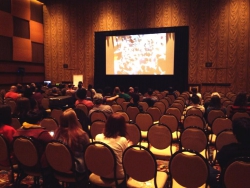Feb
6
2014

Written by Sean Thomas-Breitfeld
What do Laverne Cox, Rinku Sen, Nona Hendryk, and Tarso Luis Ramos have in common? It’s Creating Change 2014! Frances and I spent last weekend at the 26th annual Creating Change conference in Houston, Texas put on by the National Lesbian and Gay Task Force. And I can say once again, this conference is a force of nature. The 4,000 attendees are from all regions of the United States and beyond. It is full of people of all ages, races/ethnicities, sexualities and genders/ gender identities. At Creating Change, we sometimes struggle with our differences, face externalized and internalized isms, and argue over the agenda for the future. But overall, there is an energy and enthusiasm when you step into the conference that is unparalleled.
Frances and I each put together a session – two of 350 over a four day period. Luna Yasui, Rebecca Fox and I facilitated a conversation about gains that can be made in states where the political environment is often hostile to efforts towards LGBT equality. We listened to how LGBT advocates from those states are thinking about building their political and organizational power through strategies that go beyond legislative negotiation and policy change. Frances gave a brief overview of our report At the Crossroads: The Future of the LGBT Movement and moderated a terrific panel including Desiree Flores, Rebecca Fox and Edgar Villanueva. They addressed both the obstacles to movement building and their perspectives of what was possible from a funders’ perspective. As Desiree said, building movement is not just about electoral strategies but it also about cultural change – the changes we see in our families and in our community.
There was lots of laughter, running into friends and colleagues. And there were hard discussions about how we move forward not only in the LGBT community but as part of a broader movement where we see and act on the connections between our issues, understanding the compound effects of oppression.
Creating Change is different because it allows us to catch a glimpse of the unity in diversity that so many movements aspire to, and lets us believe that we may be not that far away from that beloved community.
